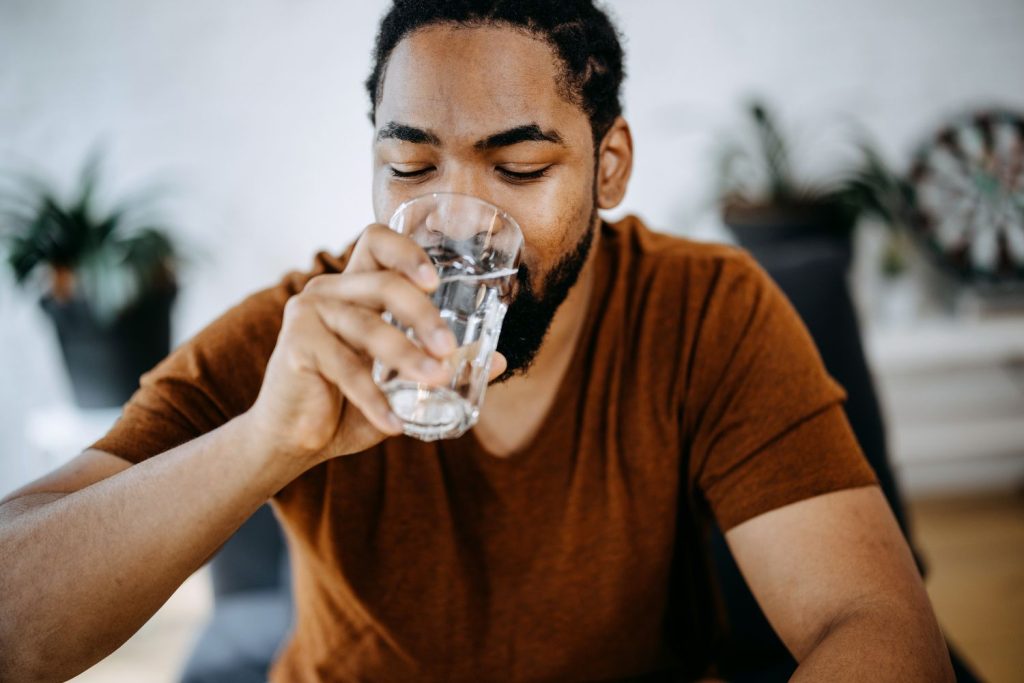:max_bytes(150000):strip_icc():format(jpeg)/water-GettyImages-1388260826-3dab4316d4894f2f896530c66c6e23c3.jpg)
How much water you should drink each day depends on several factors, but generally healthy people need 4 to 6 cups of plain water each day, depending on what other beverages and foods you eat.
Getting enough water daily is essential to staying healthy. The widespread advice is to drink 8 glasses (64 ounces) of water daily, but this recommendation does not apply to everyone. Daily water intake recommendations vary based on age, sex, activity level, pregnancy, breastfeeding, and health status.
The amount of water your body needs varies and depends on how much you exert yourself and how much you urinate or sweat. For most healthy adults, this is the volume of fluids to prevent dehydration:
- 13 cups for males
- 9 cups for females
When estimating your water needs, consider how much you get from other beverages or foods high in water content, like fruits and vegetables. On average, about 22% of our water intake comes from food.
Recommended Water Intake by Age
There is no exact amount of water for each age group, but there are general guidelines for moderate exercise and temperature.
- Infants: Experts do not recommend water for infants before 6 months of age. Between 6 and 12 months of age, 1/2 cup to 1 cup (4 to 8 ounces) is recommended.
- Children: One cup to 5 cups of water is recommended for children, along with 2 to 3 cups of milk.
- Adolescents: Seven to 8 cups of water is recommended for adolescents.
- Adults. Total water needs are estimated at 15.5 cups (3.7 liters) for adult males and 11.5 cups (2.7 liters) for adult females. This includes water from all sources—plain water, water in other beverages, and water in foods.
- Pregnancy: According to the American College of Obstetricians and Gynecologists (ACOG), you need to drink 8–12 cups (64–96 ounces) of water daily during pregnancy. This amount is in addition to water you may get from foods and other beverages.
- Breastfeeding: To compensate for the extra water used to make breast milk, 16 cups of water are recommended daily, which can come from food, beverages, and drinking water.
- Older adults: The National Academy of Medicine suggests an adequate intake of about 13 cups of daily fluids for males and 9 cups for females aged 51 and older. With a higher risk of dehydration and health issues, getting enough water is essential for older adults.
Water Intake and Exercise
Whether you exercise for recreation or you’re an athlete, proper hydration is important for performance and overall health. Water regulates body temperature and lubricates your joints. It helps transport nutrients to give you energy and keep you healthy.
The American Council on Exercise has suggested the following basic guidelines for drinking water before, during, and after exercise:
- Drink 17 to 20 ounces of water two to three hours before exercising.
- Drink 8 ounces of water 20 to 30 minutes before starting to exercise or during your warm-up.
- Drink 7 to 10 ounces of water every 10 to 20 minutes during exercise.
- Drink 8 ounces of water no more than 30 minutes after you stop exercising.
One very small study of eight males found drinking larger, less frequent water servings or drinking smaller, more frequent water servings are both effective ways to get adequate hydration and limit body water loss during heavy-intensity work in the heat.
Depending on how long and hard you exercise, electrolytes may or may not be needed. Electrolytes include salt and minerals such as potassium, phosphate, calcium, and magnesium. Maintaining electrolyte balance maximizes the performance of the body’s muscles, organs, and joints.
A sports drink that includes both carbohydrates and electrolytes is recommended for exercise sessions lasting longer than 60–90 minutes. One study found hypotonic carbohydrate-electrolyte drinks ingested continuously during exercise provided the greatest benefit to hydration. These drinks are lower in salt and sugar.
Factors that Affect Water Needs
While recommended daily intakes by age and activity are helpful. There are additional factors that affect how much water you need.
Things that impact water requirements include:
- Body size
- Sweat rate
- The heat and humidity in your environment
- Your clothing
- How long and hard you are exercising
You also may need more water if you:
- Live or work in a hot climate
- Are physically active and sweat a lot
- Have a fever, diarrhea, or vomiting
- Are pregnant or breastfeeding
It’s possible to get too much water if you have certain health conditions, such as:
- Thyroid disease
- Kidney or liver problems
- Heart problems
With these conditions, water intake may need to be lowered or closely monitored.
If you’re taking medications that make you retain water, like nonsteroidal anti-inflammatory drugs (NSAIDs), opiate pain medications, and some antidepressants you may need to decrease how much water you drink.
How Much Should You Drink Based on Your Weight?
Many online sources suggest calculating daily water intake based on weight, such as drinking .5 to 1 ounce of water per pound you weigh. However, there is no universally accepted formula to measure the amount of water you should drink based on weight. Too many factors affect individual needs, including foods you eat, activity level, and overall health.
The best way to check if you’re drinking enough is to track your urine output and look for a pale yellow color with no odor. That indicates you’re well-hydrated.
Health Benefits of Drinking Water
Maintaining proper amounts of water in the body is critical for normal physiological functions. In infants, water accounts for about 80% of body weight. That decreases to about 60% in adult men and 50% in adult women.
Replenishing water in the body is key to meeting many biological needs such as:
- Regulating body temperature and blood pressure
- Lubricating and cushioning your joints
- Protecting your spine and other body tissues
- Ridding the body of waste through sweat, urine, and bowel movements
- Preventing urinary tract infections, kidney stones, and constipation
- Maintaining healthy skin
- Supporting body functions such as neurological function, digestion, and kidney function.
Water and Weight Loss
There is some evidence that drinking more water helps you lose weight. One study found that 30% of adults in the United States who tried to lose weight stated that they drank a lot of water. A smaller research study showed that 59% of adults applied drinking water frequently as a weight loss or weight control practice.
Researchers have found the following reasons for this connection between water intake and shedding pounds:
- People who drink water before a meal may eat less.
- Water stimulates thermogenesis, which is when the body heats up and increases your metabolism.
- When water replaces sugary or alcoholic beverages, it lowers calorie intake.
The Dietary Guidelines for Americans recommends choosing calorie-free beverages, such as water, as a primary source of hydration over other sugar-sweetened beverages as part of a healthy diet.
Other Ways to Stay Hydrated
There are many other beverages besides water to help you stay hydrated.
Best choice beverages include:
- Low- or no-calorie beverages such as plain coffee, plain tea, sparkling or seltzer water, and flavored waters
- Drinks with calories and other essential nutrients, such as dairy and fortified nondairy milk, 100% fruit and vegetable juices, or smoothies
Other fluids that can help you stay hydrated, but should be limited include:
- Sugar-sweetened beverages, such as soda and fruit drinks
- Caffeinated drinks such as energy drinks, as well as coffees, and teas with added milk and sweeteners
- Drinks with sugar alternatives
- Sports drinks
Sports drinks generally contain carbohydrates, electrolytes, and vitamins. Research indicates that sports drinks may benefit people engaged in vigorous exercise for more than one hour, especially if they are sweating heavily. For most people, regular water is sufficient to stay hydrated during exercise.
Preventing Dehydration
People lose (and must replace) water throughout the day from sweating, breathing, urinating, and having bowel movements. For healthy people, the vasopressin hormone (also called the antidiuretic hormone) and the kidneys help to balance fluid loss.
If you are regularly drinking water or consuming foods and beverages that replenish the water in your body, you should be able to maintain healthy levels of hydration. Without that constant replenishing, though, you can become dehydrated,
Signs of dehydration include:
Can You Drink Too Much Water?
Although drinking too much water is uncommon in healthy adults, occasionally overhydration can occur in athletes, people with kidney problems, or people taking certain medications that can cause excessive thirst.
Drinking too much water makes it hard for the kidneys to get rid of the excess water. The sodium content of your blood becomes diluted, and cells in the brain and other parts of the body swell with water. This is called hyponatremia, and it can be life-threatening.
Summary
Drinking water is necessary for optimal health. The amount of daily water intake required to stay hydrated can vary depending on your specific needs, health conditions, and lifestyle. You can also consume water and fluids through foods and other beverages. If you live or work in a hot climate or exercise and sweat a lot, consider increasing the number of glasses of water you drink daily.








